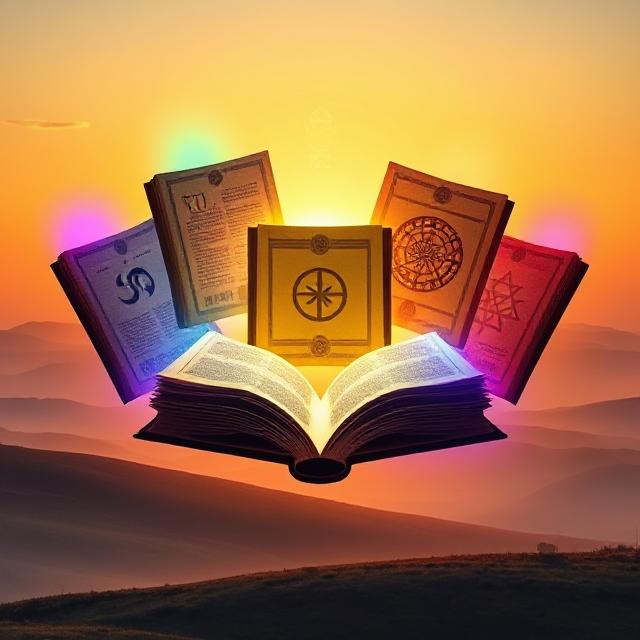
Table of Contents
Top 5 Religious Texts for Philosophical Insight
Introduction: The Bridge Between Religion and Philosophy
Philosophy and religion are often separated by academic boundaries, but history tells a different story. Some of the most profound philosophical questions—about existence, the self, morality, suffering, and the cosmos—have been explored not in abstract treatises but in sacred texts. These texts are more than devotional literature. They are rich repositories of metaphysical speculation, ethical reasoning, and psychological depth.
This post explores five religious texts that offer not just spiritual comfort but also philosophical challenge and clarity, influencing thinkers across cultures and centuries.
I. The Bhagavad Gita (Hinduism)
Origin: India, c. 5th–2nd century BCE
Philosophical Themes: Duty (Dharma), detachment, self-realization, the nature of reality
Why It Matters
The Bhagavad Gita, a dialogue between the warrior Arjuna and the god Krishna, is a philosophical cornerstone of Indian thought. As Arjuna hesitates before battle, Krishna expounds on the eternal nature of the soul (Atman), the impermanence of the body, and the role of action without attachment.
Key Concepts
- Dharma: Ethical duty, irrespective of personal gain
- Karma Yoga: Action without attachment to outcome
- Jnana Yoga: The path of knowledge and realization
- Maya: The illusory nature of worldly experience
Philosophical Influence
- Inspired Schopenhauer, Emerson, and Gandhi
- Offers a theory of self and duty grounded in cosmic order
- Challenges ego-centered ethics with a transcendental framework
II. The Tao Te Ching (Taoism)
Origin: China, 6th century BCE (traditionally attributed to Laozi)
Philosophical Themes: Non-action (wu wei), natural harmony, paradox, simplicity
Why It Matters
The Tao Te Ching is perhaps the most enigmatic yet elegant work of Eastern philosophy. It emphasizes aligning with the Tao—the ineffable Way underlying the universe. The book is poetic, suggestive, and paradoxical, encouraging intuitive rather than rational understanding.
Key Concepts
- Tao: The source of all that is, beyond definition
- Wu Wei: Effortless action in accord with nature
- Yin and Yang: Balance and duality in all life
- Simplicity: Letting go of control and excess
Philosophical Influence
- Heavily influenced Chinese metaphysics, aesthetics, and governance
- Inspired Heidegger, Alan Watts, and Zen thought
- Challenges the Western ideal of control through a philosophy of flow
III. The Book of Ecclesiastes (Hebrew Bible)
Origin: Ancient Israel, c. 3rd century BCE
Philosophical Themes: Impermanence, meaninglessness, skepticism, existential reflection
Why It Matters
Ecclesiastes stands out among biblical texts for its raw existentialism. “Vanity of vanities, all is vanity,” it declares, questioning the value of wealth, wisdom, and even righteousness. Unlike other religious texts promising salvation or order, Ecclesiastes confronts absurdity head-on.
Key Concepts
- Hevel: Translated as “vanity,” “breath,” or “meaninglessness”
- Time and Death: All things pass under the sun
- Enjoy the Present: A recurring exhortation despite uncertainty
- Limit of Wisdom: Even the wise perish
Philosophical Influence
- Resonated with Camus, Kierkegaard, and Tolstoy
- Acts as a precursor to existentialist thought
- Offers a critique of both blind faith and rational arrogance
IV. The Dhammapada (Buddhism)
Origin: India/Nepal, around 3rd century BCE
Philosophical Themes: Suffering, impermanence, mind training, ethical discipline
Why It Matters
Part of the Pali Canon, the Dhammapada is a collection of verses attributed to the Buddha. It captures the essence of Buddhist philosophy in pithy, practical statements. The focus is not on metaphysical speculation, but on the path to inner liberation through mindfulness and ethics.
Key Concepts
- Dukkha: Suffering is inherent in life
- Anicca: Everything is impermanent
- Mind as Source: “All that we are is the result of what we have thought”
- Eightfold Path: Ethical and meditative practices for ending suffering
Philosophical Influence
- Formed the foundation of Theravāda Buddhist philosophy
- Influences psychology (mindfulness-based therapies) and ethics
- Encourages a phenomenological, introspective approach to existence
V. The Gospel of John (Christian New Testament)
Origin: 1st century CE, Roman Palestine
Philosophical Themes: Logos, divine presence, eternal life, love and light
Why It Matters
Among the four canonical gospels, John is the most metaphysical. Opening with “In the beginning was the Word (Logos),” it draws on Greek philosophical concepts to frame the life and teachings of Jesus as expressions of eternal truth.
Key Concepts
- Logos: The divine reason or principle that orders the cosmos
- Light vs Darkness: A dualism between truth and ignorance
- Eternal Life: Not just after death, but a way of being now
- Love and Truth: Interwoven as pathways to divinity
Philosophical Influence
- Bridges Greek philosophy with Jewish mysticism
- Influenced Origen, Augustine, and Kierkegaard
- Forms the metaphysical core of Christian existentialism
Honorable Mentions
- The Quran – Rich in ethical, legal, and mystical philosophy, especially in Sufi interpretations
- The Upanishads – Early Hindu texts exploring Brahman, Atman, and non-duality
- The Talmud – A complex, dialogical tradition of legal reasoning and moral philosophy
Final Reflections: Wisdom Beyond Borders
These religious texts are not just guides for believers—they’re mirrors for philosophers, inviting us to reflect on mortality, meaning, freedom, and the self. They don’t offer easy answers but provoke the kind of questioning that lies at the heart of philosophy.
If you approach these works not as dogma but as thought-worlds, you’ll find that each opens a different angle into truth.
Whether you’re drawn to the action without attachment of the Gita, the stillness of the Tao, or the skeptical anguish of Ecclesiastes, these texts illuminate the spiritual and philosophical paths humans have carved for millennia.
📌 TL;DR Summary
- Religious texts can be profound philosophical works
- Top 5: Bhagavad Gita, Tao Te Ching, Ecclesiastes, Dhammapada, Gospel of John
- Themes include impermanence, duty, non-attachment, suffering, divine logos
- Each offers a unique lens on truth, ethics, and the self
- Reading them expands philosophical perspective beyond Western frameworks
